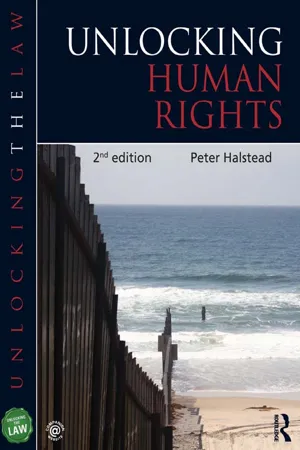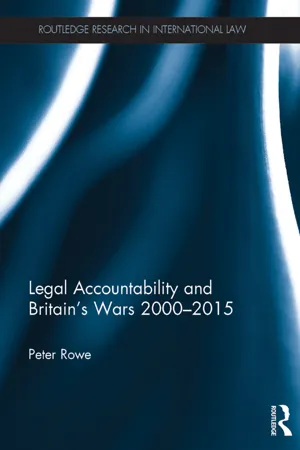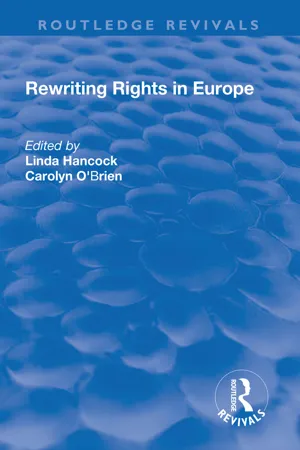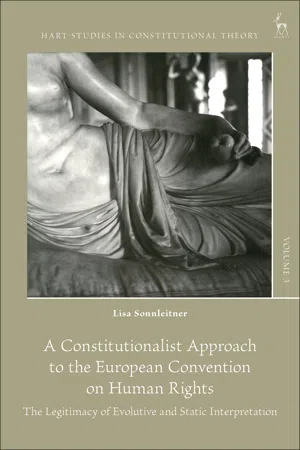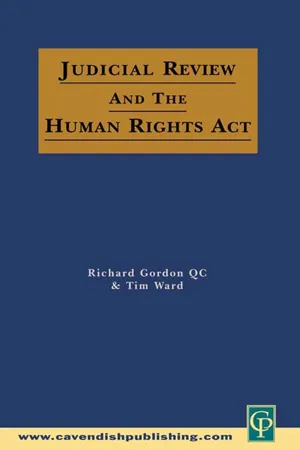Law
Article 5 echr
Article 5 of the European Convention on Human Rights (ECHR) protects the right to liberty and security. It sets out specific circumstances under which individuals can be deprived of their liberty, such as lawful arrest or detention. The article also establishes the right to challenge the lawfulness of detention and to be released if it is found to be unlawful.
Written by Perlego with AI-assistance
Related key terms
9 Key excerpts on "Article 5 echr"
- Carla M. Buckley, Krešimir Kamber, Pamela McCormick, David J. Harris(Authors)
- 2022(Publication Date)
- Council of Europe(Publisher)
Edinburgh Law Review at 399.Edwards R. A. (2020), “Police Powers and Article 5 ECHR: Time for a New Approach to the Interpretation of the Right to Liberty”, 41 Liverpool Law Review 331.Macovei M. (2004), The Right to Liberty and Security of the Person: A Guide to the Implementation of Article 5 of the European Convention on Human Rights, Human rights handbooks No. 5, Council of Europe, Strasbourg, available at https://www.coe.int/en/web/human-rights-rule-of-law/human-rights-handbooks , accessed 11 April 2022.Murdoch J. (2002), Article 5 of the European Convention on Human Rights: The Protection of Liberty and Security of Person, Human Rights Files No. 12 rev., Council of Europe.Naismith S. (2019), “Applicability of Article 5 of the Convention to persons at liberty”, in Sicilianos et al. (eds) Intersecting views on national and international human rights protection, liber amicorum Guido Raimondi 637, Wolf Legal Publishers, Tilburg.Putman E. and Giacopelli M. (eds.) (2015), Les droits fondamentaux des personnes privées de liberté, Mare & Martin, Paris.Stark S. (2019), “Deprivations of liberty: Beyond the paradigm”, 2 Public Law 380.Zyl Smit D. (van) and Appleton C. (2019), Life Imprisonment: A Global Human Rights Analysis, Harvard University Press, Cambridge.1 Preamble to the Statute of the Council of Europe, ETS No. 1, 5 May 1949.2 S., V. and A. v. Denmark (2018) [GC], paragraph 73.3 Storck v. Germany (2005), paragraphs 101–102; El-Masri v. “the former Yugoslav Republic of Macedonia” (2012) [GC], paragraph 239 (CIA rendition case).4 See further Travaux préparatoires to the Convention, DH (56) 10 CDH (67) 10.5 Human Rights Committee, General Comment 35: Article 9 (liberty and security of person), 16 December 2014. See also Delgado Páez v. Colombia (1990), UN Doc CCPR/C/39/D/195/1985, IHRL 1701 (UNHRC 1990), paragraph 5.5.6 Engel and Others v. the Netherlands- eBook - ePub
The EU Charter of Fundamental Rights
A Commentary
- Steve Peers, Tamara Hervey, Jeff Kenner, Angela Ward, Steve Peers, Tamara Hervey, Jeff Kenner, Angela Ward(Authors)
- 2021(Publication Date)
- Hart/Beck(Publisher)
79 This is designed to ensure protection for those held by private actors such as hospitals and security firms which increasingly supplement state actors in the management of prisons and detention centres.(b) Detention Must be in Accordance with the Law06.24 The most basic requirement here under Article 5 echr is that detention be in ‘accordance with a procedure prescribed by law’. This means first that there must be a legal framework authorising detention.80 Furthermore, the national rules governing the detention must be complied with.81 The Court of Justice and the EU legislature have become increasingly important in relation to the issue because of the growing authorisation of detention pursuit to EU law within the migration and criminal justice fields. Where there is more than one source of ‘law’, such as national and EU law, they must both be complied with.82 EU directives must be implemented in national law but are sometimes incorrectly transposed or neglected altogether. The principle of legal certainty suggests that detainees should be able to easily know the sources of law relied upon for their detention and the limitations upon this power. Indeed, the Court of Justice in Al Chodor required Member States to implement a directive authorising detention by creating a specific legislative code to improve transparency.83 This is increasingly important because EU law provides both the only grounds for detention and time limits under the Framework Directive on the European Arrest Warrant, the Returns Directive, the Reception Conditions Directive and the Dublin III Regulation. Depending upon the precise circumstances, it might be that a combination of domestic and EU norms should therefore be considered binding. Certainly, in relation to Article 3 ECHR at least, the European Court of Human Rights has found that breach of a Directive can contribute to creating Member State liability.84 - eBook - ePub
- Peter Halstead(Author)
- 2014(Publication Date)
- Routledge(Publisher)
ex officio considered the applicability of Articles 6 (fair hearing) and 5. They unanimously found that there had been a breach of Article 5 but concluded that no other articles of the Convention or of Protocol 1 had been violated.What is helpful in understanding the nature of Article 5 are the points made by the Commission at this early stage in Convention jurisprudence about the scope and importance of liberty:1. Article 5(1) is not concerned with ‘mere restrictions on liberty of movement’: in proclaiming the ‘right to liberty’ it contemplated the physical liberty of persons and the need to ensure that no one was deprived of it in an arbitrary fashion.2. Article 5(1)(a) only allowed detention if it was established according to law that the claimant had committed an offence of either a criminal or disciplinary nature (here Guzzardi was being detained pending further charges).3. Article 5(1)(b)’s wording ‘to secure the fulfilment of any obligation prescribed by law’ only concerned cases where the law allowed detention in order to force a person to fulfil a ‘specific and concrete’ obligation which he had failed to satisfy.4. Article 5(1)(c) did not justify the applicant’s detention either because what this sub-paragraph allowed was detention of a person when it was ‘reasonably considered necessary to prevent him from committing an offence’ which was not adapted to support a policy of general prevention directed against an individual, or groups of people such as Mafiosi.5. Article 5(1)(e) did not permit detention of Mafiosi - eBook - ePub
Death in Custody
Inquests, Family Participation and State Accountability
- Jo Easton(Author)
- 2020(Publication Date)
- Emerald Publishing Limited(Publisher)
Part 1 The Law The first part of this book sets out the relevant law in respect of both the overarching European Court of Human Rights (ECtHR) and domestic legislation for England and Wales. It includes two chapters describing the overall human rights legal framework as well as the domestic law governing inquests following a death in custody. This part sets out the positive legal protections currently in place in relation to families participating in such inquests, as well as gaps where families cannot rely on the law to ensure participation. Article 2(1) of the European Convention on Human Rights (ECHR) emphasises that a person's right to life shall be protected by law. In 1978, the ECtHR found that Article 2 of the ECHR not only prohibits the State from taking life but also places on it a positive duty to protect life. 1 This protective aspect to the right to life has been re-affirmed and expanded upon through numerous decisions of the ECtHR: elucidating on when and what steps must be taken by a State to protect life. In 1995, the ECtHR found in McCann that in order to protect life, the State is required to ensure there is a proper investigation into any deaths caused by the use of force by State agents. 2 Any investigation must be ‘independent, prompt, contain a sufficient element of public scrutiny, and be capable of leading to a determination of whether State agents are liable’. 3 The investigation must consider not just the actions of agents of the State but also the planning and organisation of the operation governing those actions. European case law has since clarified that situations where a death may have resulted due to a failure on behalf of the State to protect life should also be investigated; this includes deaths in State custody - Peter Rowe(Author)
- 2016(Publication Date)
- Routledge(Publisher)
The UK government had argued before the ECtHR in Hassan that only IHL applied, 90 the effect of which would have been be to ‘disapply’ its obligations to him under Article 5 of the ECHR. The ECtHR held, however, that, since the ICJ had accepted that human rights law could also apply during an armed conflict, Article 5 could apply even during an international armed conflict, although its obligations would need to be ‘interpreted against the background of the provisions of international humanitarian law’. 91 This would mean that the permitted grounds for detention, set out in Article 5 (1)(a)–(f), must be ‘accommodated, as far as possible, with the taking of prisoners of war and the detention of civilians who pose a risk to security within the Third and Fourth Geneva Conventions’. 92 International humanitarian law provides only very limited grounds for a deprivation of liberty during the course of a non-international armed conflict 93 where attention has to be given specifically to Article 5, ECHR, to justify detention for short or longer periods. The lawfulness of any detention could be sought in English law (as it had been in the Northern Ireland campaign), 94 but this would now have to be consistent with the Human Rights Act 1998, and hence, in this case, with Article 5- eBook - ePub
- Linda Hancock, Carolyn O'Brien(Authors)
- 2017(Publication Date)
- Routledge(Publisher)
United Kingdom , 1998, paras 22 and 24).This privatisation of human rights has yet to develop fully, but it will likely be a growth area in the jurisprudence of the European Court of Human Rights and the domestic courts over the next decade or two (Clapham, 1995). Furthermore, such evolution will be affected by the continuing development of the relationship between European Union law and the ECHR, as the former applies both to horizontal and vertical legal relations. The impact that the ECHR will have on the Member States of the European Union (all 15 of which are signatories of the ECHR) is especially likely to increase as the ECHR is embraced ever more tightly by the more elaborate and directly effective legal regime of the European Union. In this regard, Article F of the 1993 Treaty on European Union (TEU) directs all organs of the EU to have regard for and to promote the ECHR. Indeed, there have been a number of decisions of the European Court of Justice, both before and after the coming into force of Article F of the TEU, that bear directly on the relationship between Community law and provisions of the ECHR (Stauder v Ulm , 1969; Internationale Handelsgesellschaft v EVG , 1970; Nold v Commission , 1972; Rutili v French Minister of the Interior , 1975).9 The Court's use of the Convention is set to increase markedly following the direct inclusion of Article F within the express justiciable bounds of the Court by an amendment introduced by the Treaty of Amsterdam 1997.10 - Helen Fenwick, Gavin Phillipson, Alexander Williams(Authors)
- 2020(Publication Date)
- Routledge(Publisher)
(3) Everyone arrested or detained in accordance with the provisions of paragraph 1(c) of this Article shall be brought promptly before a judge or other officer authorised by law to exercise judicial power and shall be entitled to trial within a reasonable time or to release pending trial. Release may be conditioned by guarantees to appear for trial.(4) Everyone who is deprived of his liberty by arrest or detention shall be entitled to take proceedings by which the lawfulness of his detention shall be decided speedily by a court and his release ordered if the detention is not lawful.(5) Everyone who has been the victim of arrest or detention in contravention of the provisions of this Article shall have an enforceable right to compensation.Notes
1. The guarantee under Article 5(1) refers to protection from deprivation of physical liberty, not to protection for physical safety.60 The presumption embodied in the Article is that liberty and security must be maintained. However, it then sets out the two tests which must be satisfied if a person is to be deprived of liberty. First, exceptions are set out where liberty can be taken away; second, under paras 2–4, the procedure is set out which must be followed when a person is deprived of liberty. Thus, if the correct procedure is followed, but an exception does not apply, Article 5 will be breached, as, conversely, it will if an individual falls within an exception but, in detaining him or her, the correct procedure is not followed. It will be found that a number of successful applications have been brought under Article 5 with the result that the position of detainees in Europe has undergone improvement. It should be noted that Article 5 is concerned with total deprivation of liberty, not restriction of movement, which is covered by Article 2 of Protocol 4 (at the time of writing, the UK is not a party to Protocol 4).2. In general, the case law of the Court discussed below suggests that the circumstances in which liberty can be taken away under para 5(1)(a)–(f) will be restrictively interpreted, although the instances included are potentially wide. Article 5(1) not only provides that deprivation of liberty is only permitted within these exceptions, it also requires that it should be ‘in accordance with a procedure prescribed by law’. In Winterwerp v Netherlands,61- eBook - ePub
A Constitutionalist Approach to the European Convention on Human Rights
The Legitimacy of Evolutive and Static Interpretation
- Lisa Sonnleitner(Author)
- 2022(Publication Date)
- Hart Publishing(Publisher)
Collected Courses of the Academy of European Law: The Protection of Human Rights in Europe (vol 2, Dordrecht, Martinus Nijhoff Publishers, 1991) 287.51 ibid 288.52 Stephen Gardbaum, ‘Human Rights and International Constitutionalism’ in Jeffrey L Dunoff and Joel P Trachtman (eds), Ruling the World? Constitutionalism, International Law, and Global Governance (Cambridge, Cambridge University Press, 2009) 247.53 ibid.54 ibid.55 Christopher A Ford, ‘Judicial Discretion in International Jurisprudence: Article 38(1)(C) and “General Principles of Law”’ (1994) 5 Duke Journal of Comparative and International Law 35, 55.56 Keller and Stone Sweet, ‘Assessing the Impact of the ECHR on National Legal Systems’ (n 40) 683.57 ibid 703–04.58 Alec Stone Sweet and Helen Keller, ‘The Reception of the ECHR in National Legal Orders’ in Helen Keller and Alec Stone Sweet (eds), A Europe of Rights: The Impact of the ECHR on National Legal Systems (Oxford, Oxford University Press, 2008) 14.59 Keller and Stone Sweet, ‘Assessing the Impact of the ECHR on National Legal Systems’ (n 40) 703–04.60 Gardbaum (n 52) 249.61 ibid 253.62 ibid 255.63 Brun-Otto Bryde, ‘International Democratic Constitutionalism’ in Ronald J St Macdonald and Douglas M Johnston (eds), Towards World Constitutionalism: Issues in the Legal Ordering of the World Community (Leiden, Martinus Nijhoff, 2005) 106.64 Gardbaum (n 52) 251–52.Passage contains an image
7Three Basic Constitutional Principles of the ECHRT he major implication of the Convention’s constitutional character is that the member states of the Convention are bound by the unifying fundamental values. These unifying values should be understood as a normative fundament consisting of more abstract constitutional principles, which have shaped the interpretation of the Convention rights. This relates to Barak’s observation in the context of constitutional interpretation, who argues that ‘The values and principles underlying the constitution … form a normative umbrella that extends over the constitution itself’.1 Yet, the question remains as to which constitutional principles we speak of in the context of the ECHR. If we want to identify the normative constitutional framework, which informs the interpretation of the Convention rights, we have to dig deeper than the Convention text itself.2 These values are evident if we shed more light on the most fundamental concepts to which a community is committed. This commitment may be visible in foundational documents of a legal community and in the significance which is accorded to these principles within the community.3 - eBook - ePub
- Richard Gordon, Tim Ward(Authors)
- 2013(Publication Date)
- Routledge-Cavendish(Publisher)
18 the decision is especially significant because the recognition of the relevance of the ECHR provisions was unnecessary for the Court's ruling.16 Case 36/75 Rutili v Ministre de l'Intérieur [1975] ECR 1219.17 See para 32 of the judgment in Rutili summarising the effect of the cited ECHR provisions as being that ‘no restrictions in the interests of national security or public safety shall be placed on the rights secured … other than such as are necessary for the protection of those interests in a democratic society’.18 See Francis G Jacobs and Robin CA White, The European Convention on Human Rights, 2nd edn, 1996, Clarendon, p 411.The modern view
7.14 Since Rutili, the Convention has become firmly established as an analytical tool of the ECJ. The ECJ has even subjected its own procedures to scrutiny on Convention grounds. In Emesa Sugar v Aruba,19 it considered and rejected a challenge to the role of theAdvocate General based upon Article 6(1) of the ECHR.19 Case C-17/98 Emesa Sugar (Free Zone) NV v Aruba (2000) The Times, 29 February.7.15 Although the ECJ has advised in Opinion 2/94 on Accession by the Community to the ECHR20 that the Community lacks competence to accede to the ECHR, that Court's Opinion contains a clear summary of the status of the ECHR in Community law. Materially, the ECJ observes thus:20 [1996] ECR I-1759.It is well settled that fundamental rights form an integral part of the general principles of law whose observance the Court ensures. For that purpose, the Court draws inspiration from the constitutional traditions common to the Member States and from the guidelines supplied by international treaties for the protection of human rights on which the Member States have collaborated or of which they are signatories. In that regard, the Court has stated that the Convention has special significance…21
Learn about this page
Index pages curate the most relevant extracts from our library of academic textbooks. They’ve been created using an in-house natural language model (NLM), each adding context and meaning to key research topics.


